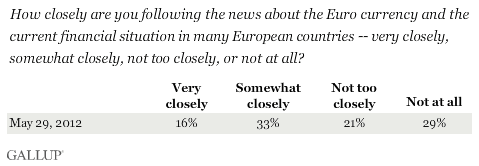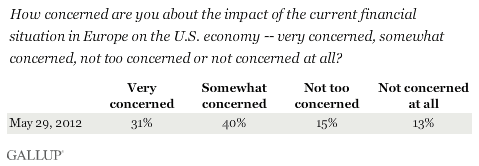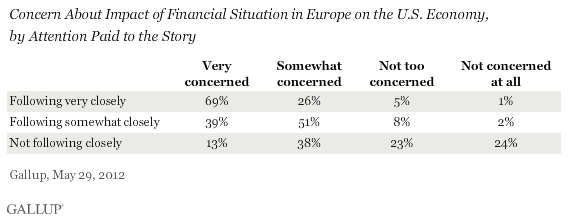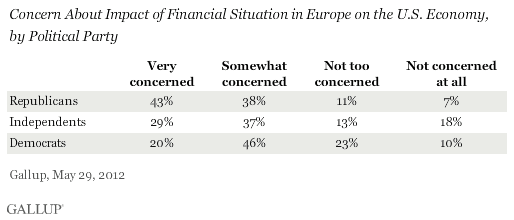PRINCETON, NJ -- Forty-nine percent of Americans say they are following the news about the European financial situation at least somewhat closely, including 16% who say very closely.

By comparison, Gallup has found an average of 60% of Americans paying very or somewhat close attention to major U.S. news stories over the past two decades. Thus, Americans do not appear highly tuned in to the financial troubles in Greece, Spain, Ireland, and other European countries, despite their prominence in the news for many months. The highest percentage paying very or somewhat close attention out of more than 200 stories Gallup has measured is the 97% who were following the Sept. 11 terrorist attacks closely in 2001.
The new findings are based on a May 29 Gallup poll. Although Americans are not paying a high degree of attention to the European economic crisis, they do express some concern about its impact on the United States economy. Gallup finds 71% saying they are concerned, including 31% who are very concerned.

Earlier this year, Gallup found a slightly higher percentage expressing concern about Europe when it asked about the situation there as one of several possible threats to the U.S. economy. However, the European financial crisis elicited the least concern of four issues tested in that poll.
The data suggest that Americans' concern about Europe might be higher if more were paying attention to it. Among the 16% of Americans paying very close attention to the news about the European financial situation, 95% are concerned, including 69% who are very concerned.

Republicans (61%) are paying greater attention to the issue than independents (46%) and Democrats (43%), which in turn leads to Republicans' expressing greater concern than other party groups about its impact on the economy.

Implications
The financial troubles in Europe may seem remote to many Americans. This is understandable, given that what happens with European economies does not have an obvious impact on Americans' day-to-day lives. Even so, 7 in 10 Americans say they are concerned about what is occurring in Europe.
But the European financial crisis has been linked to some of the recent volatility in the U.S. stock market and, if it persists, it has the potential to affect the U.S. economy in more obvious ways, such as through decreased U.S. exports, less European investment in the United States, and decreased lending by U.S. banks domestically due to concern about possible future effects of the European situation.
To the extent these events occur, which would create a clear drag on the U.S. economy, Americans would be expected to pay more attention to the events in Europe, grow more concerned about their effect on the U.S. economy, and become less confident about the U.S. economy.
Survey Methods
Results for this Gallup poll are based on telephone interviews conducted May 29, 2012, on the Gallup Daily tracking survey, with a random sample of 1,013 adults, aged 18 and older, living in all 50 U.S. states and the District of Columbia.
For results based on the total sample of national adults, one can say with 95% confidence that the maximum margin of sampling error is ±4 percentage points.
Interviews are conducted with respondents on landline telephones and cellular phones, with interviews conducted in Spanish for respondents who are primarily Spanish-speaking. Each sample includes a minimum quota of 400 cell phone respondents and 600 landline respondents per 1,000 national adults, with additional minimum quotas among landline respondents by region. Landline telephone numbers are chosen at random among listed telephone numbers. Cell phone numbers are selected using random-digit-dial methods. Landline respondents are chosen at random within each household on the basis of which member had the most recent birthday.
Samples are weighted by gender, age, race, Hispanic ethnicity, education, region, adults in the household, and phone status (cell phone only/landline only/both, cell phone mostly, and having an unlisted landline number). Demographic weighting targets are based on the March 2011 Current Population Survey figures for the aged 18 and older non-institutionalized population living in U.S. telephone households. All reported margins of sampling error include the computed design effects for weighting and sample design.
In addition to sampling error, question wording and practical difficulties in conducting surveys can introduce error or bias into the findings of public opinion polls.
Polls conducted entirely in one day, such as this one, are subject to additional error or bias not found in polls conducted over several days.
View methodology, full question results, and trend data.
For more details on Gallup's polling methodology, visit www.gallup.com.
